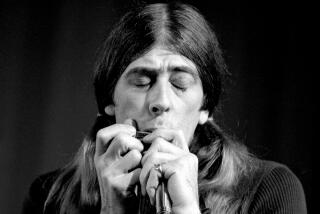Noted Jazz Drummer Kenneth Clarke Dies at 71
- Share via
Kenneth (Klook) Clarke, an original member of the Modern Jazz Quartet and a drummer credited with adapting 4/4 rhythms to the more sophisticated demands of be-bop, died Saturday of a heart attack at his home in the Paris suburb of Montreuil-sous-Bois. He was 71 and had settled in France in 1956 after completing a European tour.
The son of a trombonist, Clarke made more than 300 records and played with such jazz greats as Thelonious Monk, Charlie Parker, Dizzy Gillespie, Ella Fitzgerald and Louis Armstrong.
Most recently he had virtually retired from the Paris nightclub scene, but he played a short while ago at the Petit Journal on the Boulevard St. Michel in Paris, owner Andre Damon told the Associated Press.
Times jazz critic Leonard Feather, in his anthology “The Encyclopedia of Jazz,” credited Clarke with being “the first drummer to evolve from the old sock-cymbal style into a subtler approach; using the top cymbal for steady rhythm, he used the bass drum for unexpected punctuations, integrating drums with arrangement and soloists.”
Clarke originally studied piano, drums and trombone and in 1935 became a drummer for trumpeter Roy Eldridge. During the 1930s, when black musicians often were hard-pressed to find work, he toured Finland and Sweden, returning to join the Teddy Hill band in 1939.
In 1941 he and guitarist Charlie Christian, pianist Monk and saxophonist Parker were jamming at Minton’s in New York City--sessions that many believe were the genesis for the bop generations that followed.
Clarke shortly after joined the Armstrong, Fitzgerald and Benny Carter bands and, after Army service in World War II, hired on with Gillespie in 1946. He toured France with Gillespie and then became a fixture at the Royal Roost in New York while free-lancing at the Cafe Bohemia and other clubs.
In 1952 he and pianist John Lewis, vibraphonist Milt (Bags) Jackson and bassist Percy Heath formed the Modern Jazz Quartet, which quickly became a congruent force in the music of that era. Clarke stayed but three years and was replaced by Connie Kay.
After moving to France, Clarke played regularly at the Blue Note and Club St.-Germain in Paris.
More to Read
The biggest entertainment stories
Get our big stories about Hollywood, film, television, music, arts, culture and more right in your inbox as soon as they publish.
You may occasionally receive promotional content from the Los Angeles Times.









